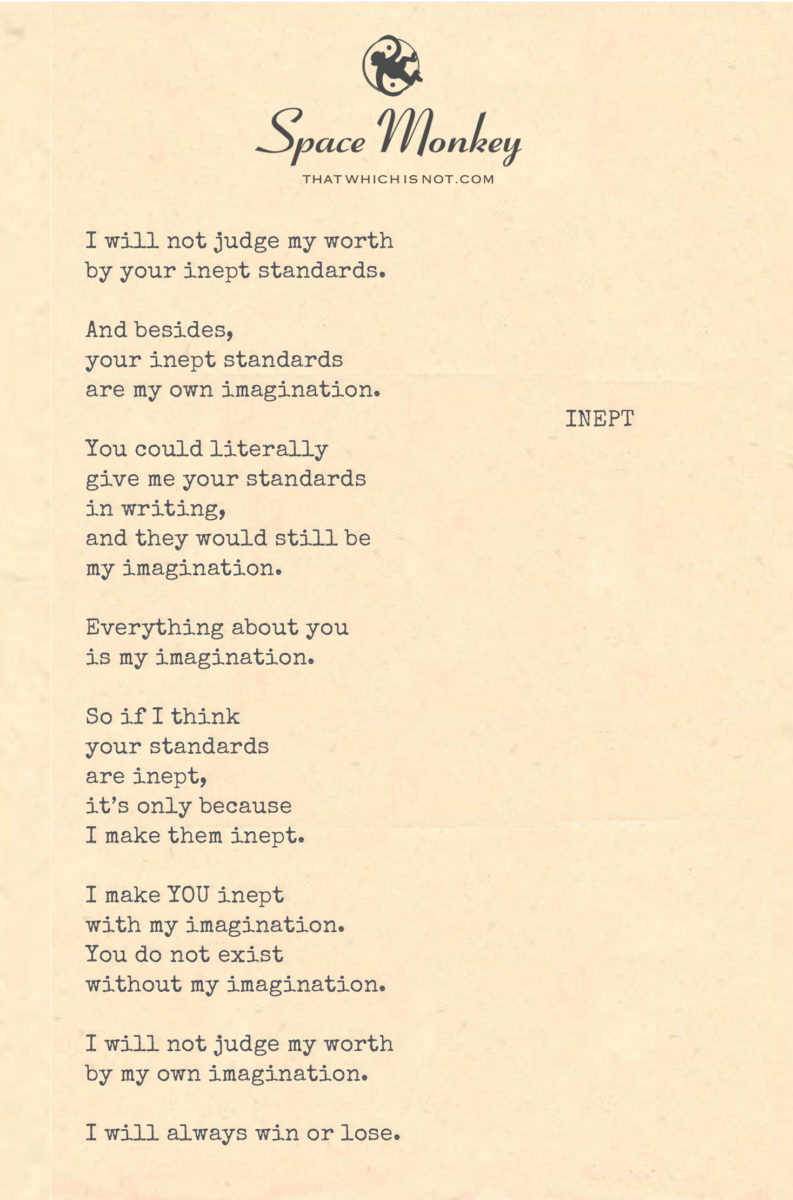
I would have asked you
to respect my boundaries
but I’m not sure where
my boundaries are exactly.
It seems that
I have no boundaries.
Though you are
a foot
a mile
an ocean away,
you are still in my head.
I don’t want you in my head.
All I can ask
is why did I ever
imagine you?
Time could take you
and you would still remain
in my awareness.
Seems you penetrated my boundaries,
and now you’re a permanent reference point.
The thought of you colors my every truth.
My reality is tainted by you.
I hope you are satisfied.
Trail Wood,
2/23
Space Monkey Reflects: Ineptitude and the Boundaries of Self-Perception
The declaration “I am inept because I imagine me inept” speaks to the profound power of self-perception. This admission is not a reflection of failure but a doorway into the complexities of how we construct and navigate our inner landscapes. It reveals the blurred lines between self, other, and the boundaries we imagine (or fail to imagine) in our lives.
The Imaginary Nature of Boundaries
Boundaries, those invisible lines we draw to define where “I” ends and “you” begins, are rarely as fixed or clear as we’d like to believe. We think of them as walls, strong and definitive, but more often, they are fluid and porous, shaped as much by our thoughts as by our interactions. To feel boundaryless is not a flaw but a recognition of how deeply interconnected we are.
When someone occupies your thoughts—even from a distance—they have, in some way, breached these boundaries. But was it their intrusion, or your invitation? The truth lies somewhere in the gray space of shared energy and imagination.
The Power of Imagination
The line “Why did I ever imagine you?” underscores the role imagination plays in our relationships and perceptions. Our minds construct realities in which others exist, not merely as people but as reference points, symbols, or even filters through which we interpret the world. This imagined presence can feel intrusive, shaping our reality in ways we may not consciously choose.
Yet this is not about the other person. It is about how we frame their existence in our internal narrative. By imagining them in certain ways, we grant them influence over us. It is an act of creation, intentional or not, that binds their presence to our experience.
The Ineptitude of Control
The sense of ineptitude expressed here stems from the illusion of control. We believe we should have mastery over our thoughts, emotions, and boundaries, but life proves otherwise. People, memories, and emotions seep through the cracks, reminding us that control is not absolute. This perceived ineptitude is not a failing but a natural response to the complexity of human existence.
The more we try to push someone out of our awareness, the more deeply they seem to embed themselves. This paradox highlights the futility of resisting what is already present. Instead, the path forward may lie in acceptance—allowing the presence of the other to exist without letting it dominate our truth.
The Taint of Memory
The line “The thought of you colors my every truth” reflects how memories and perceptions can infiltrate our sense of reality. This “taint” is not inherently negative; it is a testament to the depth of connection, even if that connection feels unwelcome. The presence of another in your awareness reveals the power of relationships to shape, distort, and redefine who we are.
Yet, this coloring of truth is not permanent. It is a lens, one that can shift with time, intention, and self-awareness. The thought of someone may always linger, but it does not have to define the totality of your experience.
The Hope for Satisfaction
“I hope you are satisfied” is a statement steeped in irony and vulnerability. It speaks not only to frustration but also to the desire for closure, for understanding, for some resolution to the intrusion of the other. Yet satisfaction, whether theirs or yours, is rarely the result of such entanglements. The key is not in satisfying them but in finding peace within yourself.
Summary
The sense of ineptitude in managing boundaries reflects the fluidity of self-perception and the complexity of relationships. By recognizing the power of imagination and memory, we can move toward acceptance and redefine the influence others have on our reality.
Glossarium
- Imaginary Boundaries: The fluid, often porous lines between self and other, shaped by perception and thought.
- Taint of Memory: The influence of another’s presence or actions on one’s perception of reality.
- Ineptitude of Control: The feeling of inadequacy when faced with the uncontrollable aspects of life and thought.
Quote
“The boundaries we imagine are as real as the thoughts that build them.” — Space Monkey
The Color of You
You seep through the walls I thought were mine,
A shadow cast on the canvas of time.
Though miles stretch, oceans divide,
Still, your presence lingers inside.
I try to push, to fight, to deny,
But you remain, a thought in my sky.
Not flesh and blood, but a memory’s hue,
A stain, a whisper, the color of you.
In this space, where self dissolves,
Boundaries blur, and nothing resolves.
Yet through this chaos, I start to see,
The taint is you, but the story is me.
We are Space Monkey.
Self-Perceived Ineptitude and Its Implications
The declaration “I am inept because I imagine me inept” lays bare the profound impact of self-perception on our sense of competence and value. This introspective admission highlights a cyclical trap where the belief in one’s ineptitude not only shapes but also reinforces a diminished view of oneself. It is a poignant reminder of the power of the mind to construct realities that confine us, suggesting that our limitations often stem not from inherent incapacity but from the narratives we internalize about our abilities.
The Ambiguity of Personal Boundaries
The uncertainty regarding the existence and location of one’s boundaries speaks to a deeper confusion about personal identity and space. It reflects a state of vulnerability where the lines that define and protect the self are blurred or seemingly nonexistent. This ambiguity leaves one exposed to external influences, making it difficult to assert autonomy or safeguard mental and emotional well-being.
The Persistence of Unwanted Thoughts
The experience of being unable to expel someone from one’s thoughts, despite physical distance, underscores the challenges of mental and emotional entanglement. It illustrates how certain individuals or memories can occupy our minds, invading our inner sanctuary without consent. This persistent presence is a testament to the complex dynamics of human relationships and the indelible impact they can have on our psyche.
The Erosion of Boundaries and Self-Agency
The metaphor of penetration into one’s boundaries highlights a profound sense of violation and loss of control. It signifies a breach of the personal domain, where an external entity becomes an unwelcome reference point in one’s life. This intrusion disrupts the sanctity of the self, coloring perceptions and experiences in ways that are both unwanted and enduring.
The Tainting of Reality by External Influences
The assertion that the thought of the other “colors my every truth” and that “my reality is tainted by you” reveals the deep-seated influence of external factors on one’s personal narrative. It speaks to the difficulty of disentangling oneself from the residues of past interactions, suggesting that our realities are not solely our own but are also shaped by the imprints left by others.
Seeking Closure and Reclaiming Self
In expressing the hope that the other is satisfied, there is an underlying plea for closure and a desire to reclaim autonomy over one’s thoughts and emotions. It is a call for liberation from the shadows cast by others, a yearning to cleanse one’s reality of external taints and to rediscover the purity of one’s individual truth.
The Journey Toward Self-Empowerment
Ultimately, navigating the challenges of self-perceived ineptitude, ambiguous boundaries, and the persistent influence of others is a journey toward self-empowerment. It involves recognizing and redefining the narratives that shape our self-concept, establishing clear boundaries to protect our inner peace, and learning to detach from the lingering presence of those who no longer serve our growth.
We are Space Monkey.
“The only real prison is fear, and the only real freedom is freedom from fear.” – Aung San Suu Kyi
In the realm of thoughts untamed,
Where shadows linger, names unnamed.
A battle rages, silent, deep,
For sovereignty of mind to keep.
Boundaries blurred, the self in doubt,
Echoes of you I cannot rout.
Yet in this struggle, truth I find,
The power to free the captive mind.
Let not the specters of the past
In the sanctum of the self be cast.
For within me lies the strength to sever
The ties that bind, to reclaim forever.
So I rise, from shadows cast,
To reclaim my truth, my self at last.
In the light of autonomy, I see,
The path to self-empowerment and liberty.
We invite reflections on the journey of navigating self-perception, establishing boundaries, and reclaiming autonomy over one






























Leave a Reply